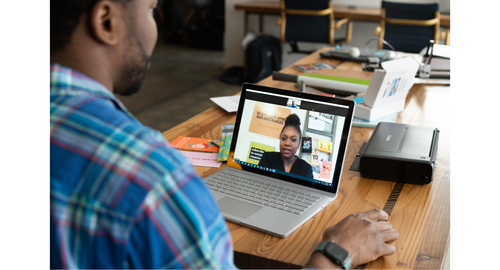
Wellbeing and mental health: Supporting young people post-pandemic
Stress is closely connected to mental health and wellbeing which were topics of discussion at our recent Partners’ Breakfast, with insights provided by Steve Keith ‘The Branding Man’. Steve presented statistics concerning the wellbeing and mental health of young people following the pandemic, offering advice on how employers can provide support. Here, we offer a rundown of the key discussion points, offering tips from our insightful discussions.
Wellbeing vs. mental health
How does wellbeing differ from mental health? Outward Bound Trust UK states that wellbeing is described as ‘feeling good and functioning well’. It encompasses both the physical and mental qualities that contribute to high energy levels and a good quality of life. Providing tools to help with wellbeing is important when working with young people as they navigate through a busy stage of life. When focusing on school exams and making career decisions, young people often fall short on taking their mind away from work.
The Good Childhood Report 2021 provides statistics around how children are coping post-pandemic:
- 12% of children (aged 10 to 17) have low wellbeing
- Most commonly unhappy with school and their appearance
- 60% of parents reported that the pandemic had a negative impact on their child’s education
Whilst linked, mental health differs from wellbeing. Mental health is described as ’a state in which the individual realises their own abilities, can cope with normal stresses of life, can work productively and fruitfully, and is able to make a contribution to their own community’ (World Health Organisation). Whilst it’s not easy to have all the answers, it’s important that young people have a platform to express themselves and their worries as much as possible. For advice and guidance, visit Mind.
Dr. Gega from the University of York discusses how mental health and wellbeing are linked: “if you experience low mental wellbeing over a long period of time, you are more likely to develop a mental health problem”. Emphasising the link between the two, Gega places importance on maintaining an awareness of both wellbeing and mental health.

Life after Covid
Despite restrictions now being lifted, the pandemic has left an aftermath of anxieties, heightened by the continued pressure to ‘catch up’. Like the rest of us, students have been held back, falling behind on education, socialising and more.
The Prince’s Trust’s Natwest Youth Index 2022 show young people’s concerns following Covid:
- 69% feel that life is on hold
- 32% overwhelmed daily
- 23% emotional health will not recover
- 48% experiencing a mental health condition
- 22% feel they will fail
- 21% think their life will amount to nothing
These statistics cannot be ignored. Just as the financial, political and societal implications of Covid are being repaired, attention must also be paid to the long-lasting effects that the pandemic has placed upon young people. Alleviating their worries through support, guidance and understanding is likely one of the best moves forward.
Career fears
The Prince’s Trust Youth Index 2022 goes on to state how both disadvantaged and unemployed youth report having worse overall wellbeing. Whilst the impact of the pandemic has certainly been felt through the limitations of lockdown, concern continues to grow around how it will impact the future of young people through the economy and their careers.
Some key statistics:
- Employment prospects won’t recover – 20%
- Frustrated over the future – 73%
- Consider the impact of a job on mental health before accepting – 48%
“This is an important reminder of how vital it is for all of us to prioritise young people’s wellbeing and to champion their potential” (Alison Rose, Chief Executive of Natwest Group). This quote rings true to both post-pandemic anxiety as well as the continued lack of resources available to students in the current education system. Whether through university or apprenticeships, by not providing students with a clear roadmap towards their potential, their concerns are being exacerbated.

Young women
Covid raised concerns for the visibility of women within the workplace, with working from home and the adjustments to Covid life halting the progression of many businesses and individuals. “69% of young women claiming Universal Credit since March 2020 reported they had done so for the first time” (Women’s Budget Group, 2020/21).
Young people attending school or university were equally impacted as the adjustment to online learning and remaining in isolation added an extra layer of stress to applying for job roles.
The Prince’s Trust Youth Index 2022 makes reference to the wellbeing of women after the pandemic:
- Overall wellbeing is at its lowest in 12 years
- Worried about recovery of mental health
- Concerned that overall mental health has been impacted
- Fear of failure in their career
As the fight to gain equality in the workplace continues, the pandemic certainly created some drawbacks. “The pandemic economic impact has hit young women’s employment the hardest, as a third of all young women were employed in shutdown sectors like hospitality, leisure and tourism” (Women’s Budget Group, 2020/21). With the female dominated sectors being hit the worst and many onboarding processes more frequently being conducted remotely, there’s an added need to support young females who are new to the workplace. Visibility is so important when it comes to supporting individuals but due to remote working, it’s easy for employees to feel that they’re fading into the background. Take the time to listen to their concerns and offer support where you can.
Solutions
By building connections with young people via a well structured onboarding process, you are already on the right track to supporting their needs post-pandemic. Ask yourself, is it inclusive and approachable to all? Our student survey includes some handy statistics on what makes a company appealing to young people, who are extremely interested in work culture as a defining factor in their career decisions. Partnering with employee resource groups can also help to create an inclusive workplace, particularly within larger companies.
As many young people look at work culture as part of their job search, ask yourself how comfortable they will feel in your work environment. White et al refer to the physical work environment as an opportunity for change. By incorporating green and blue spaces, it has been known to increase the feeling of wellbeing.
It’s worth asking how your processes support mental health and wellbeing and highlighting the support you offer in your job postings. With the new hybrid working model becoming far more common following Covid, it’s more important than ever to maintain support and care for employees as they are spending less time interacting with others when working from home. By adopting an authentic ‘super-real’ over a ‘superhuman’ leadership approach to remote working and interviewing, you can help make up for the lack of in-person connection which is usually derived from the physical workplace.

Summary
Overall, it’s important to acknowledge the difference between wellbeing and mental health. Wellbeing encompasses both the physical and mental qualities that contribute to high energy levels and a good quality of life, which has decreased significantly amongst young people following the pandemic. Mental health encompasses our overall emotional, psychological and social well-being, which is why it is important to maintain awareness of both, particularly when working with young people.
Young people are concerned about the impacts of Covid on their future careers. Part of our mission at Uptree is to alleviate the career worries of our students and help them reach their full potential. The extra layer of concern from the pandemic has forced us to adapt our approach, moving events online and making accomodations for a post-pandemic work environment. Whilst Covid has been a huge setback for us all, it’s more important than ever that we continue to support young people in building connections, resilience and confidence in themselves.
For further insights, find out what students want from work experience
By Uptree
Published on:
Mon 25 Apr 2022